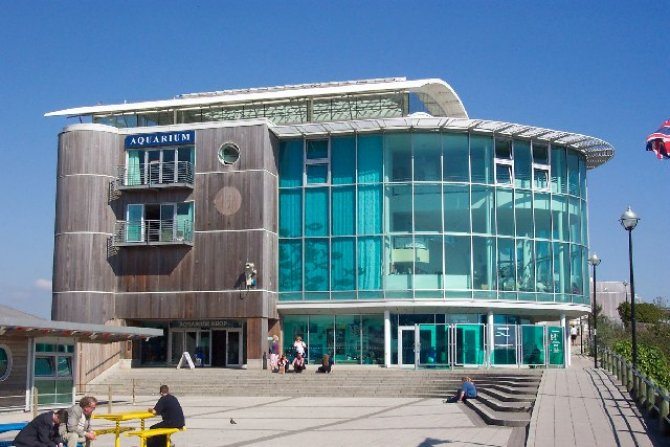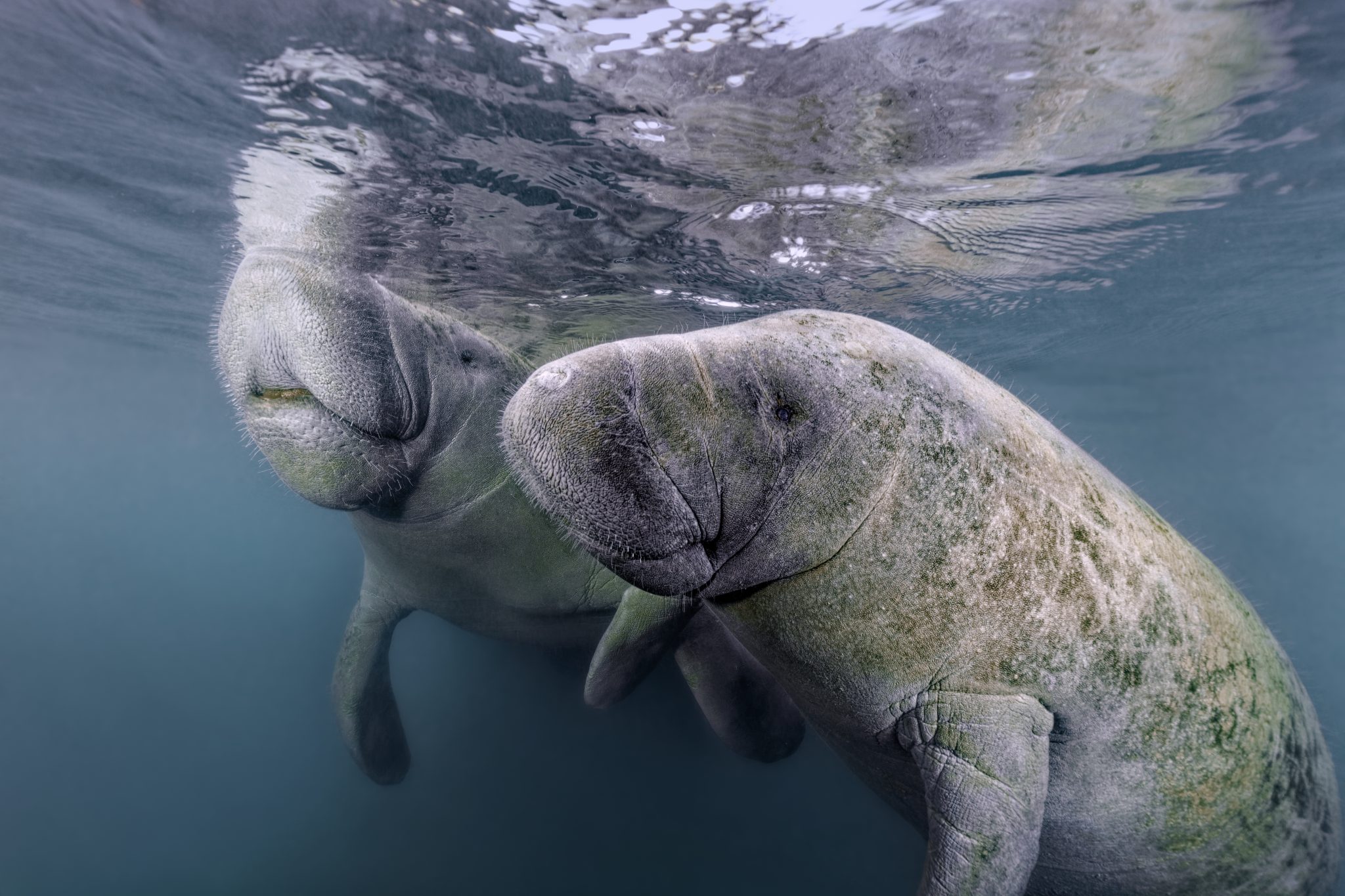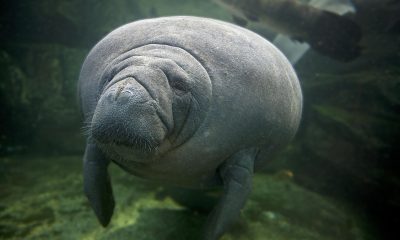Marine Life & Conservation
National Marine Aquarium Asked To Drop Fish From Menu

On the 19th Feb PETA (People for the Ethical Treatment of Animals) wrote to the Plymouth National Marine Aquarium calling on policy-makers to stop serving dead fish at in-house restaurants – a practice that contradicts the aquarium’s invitation to the public to appreciate the wonder of living fish.
I have long been aware of the pain and stress we put marine animals through when killing them for food, as well as the immense disregard for the fragile ecosystem that supports them. I know from personal experience the great work the Plymouth National Marine Aquarium does for marine research and public awareness of our oceans, but having a fish restaurant is sending confusing and mixed messages about conservation and animal welfare. Surely they should be leading the way into researching alternative food sources that can be equally financially beneficial as well as ethical.
If you are interested by the following article please write your own letter to Dr David Gibson, Managing Director, National Marine Aquarium or copy the one below and let him (and us) know your feelings. This topic will be opened up in our Forum Pages.
PETA – “Experts agree that fish are sensitive, interesting animals who feel pain and have complex social structures. No one – particularly a facility that is supposed to promote respect for sea life – needs to put them on the menu”, says PETA Director Mimi Bekhechi. “The rise of so many delicious, readily available faux-fish dishes means visitors can enjoy a tasty meal without slaughtering animals.”
Biologists have found that fish develop relationships with each other and grieve when their companions die. Some fish are capable of using tools, while others gather information by eavesdropping. These intelligent, sensitive animals are so good-natured that Dr Sylvia Earle, the world’s leading marine biologist, has said, “I wouldn’t deliberately eat a grouper any more than I’d eat a cocker spaniel”. PETA, whose motto reads, in part, that “animals are not ours to eat”, encourage all caring people to choose tasty vegan options.
Their letter reads:
Dr David Gibson, Managing Director, National Marine Aquarium
From: Dawn Carr, PETA
10 February 2015
Dear Dr Gibson,
I’m writing from People for the Ethical Treatment of Animals (PETA) UK on behalf of all the fish in the sea to ask the National Marine Aquarium to end the sale of seafood in its cafés. The National Marine Aquarium advertises itself as a place where people can cultivate an understanding of and admiration for sea animals. Yet after inviting people to look on these glorious, fascinating animals in awe, it’s odd that your cafés then invite people to stick a fork in them. Serving fish in an aquarium is like serving monkey nuggets at a zoo.
Talk of “sustainable seafood” fails to consider the implications for individual fish, but the fact remains that the seafood in your cafés is made from living sea animals who treasured life and were needlessly subjected to pain and fear.
And human consumption of sea animals is the very cause of the catastrophic destruction of life in the Earth’s oceans. Fish farms introduce non-native animals into sensitive ecosystems, and commercial fishing ships “clear-cut” the ocean floor and inadvertently maim and kill billions of non-target marine animals, including porpoises and sea lions. By encouraging people to eat sea animals, you perpetuate the problem.
Although fish may not always express suffering in ways that humans can easily recognise, experts around the world agree that fish are sensitive, interesting animals who feel pain and have complex social structures. In fact, a 2014 study from the University of Cambridge showed that fish have good memories, work collaboratively to achieve goals and have cognitive abilities that can actually surpass those of dogs and some primates. Leading marine biologist Dr Sylvia Earle said, “You know, fish are sensitive, they have personalities, they hurt when they’re wounded”.
She has also said, “I used to eat all kinds of seafood, but I know too much now. Both about how I value them alive and as individual components of what makes the world work. I’d much rather see grouper swimming in the ocean than swimming in butter with lemon slices”.
I do hope you’ll agree with her and instead consider offering your visitors animal–friendly seafood options, such as fish-free fish fingers, faux-fish cakes and even vegetarian prawns. These options are delicious, environmentally friendly and free of the toxins and cholesterol found in fish flesh and – most importantly – no one has to die for them!
Please let us know that you’ve made the responsible decision to stop serving marine animals in the National Marine Aquarium’s cafés. I can be reached at DawnC@peta.org.uk or on 020 7837 6327, extension 226. Thank you for your consideration.
Kind regards,
Dawn Carr
Manager
Special Projects
The Plymouth Herald published a reply from the Aquarium in which Dr Gibson says:
“We work to educate consumers and our visitors on the importance of eating fish and seafood that has been sourced in a sustainable way, to help nurture a sympathetic understanding of our oceans.
“All fish and seafood served in the aquarium cafe is ethically sourced and MSC compliant.
“We have a robust purchasing policy in place that is proactive in sustainable and seasonal fish, ensuring we maintain the highest levels of sustainable fish sourcing practices possible.”
Dr Gibson said the aquarium aims to educate consumers on how best to source and eat fish and seafood responsibly.
He added: “We’ve also spearheaded a number of initiatives, including helping Plymouth to win the world’s first Fish2fork Blue Fish award and our current campaign for Plymouth to become a Sustainable Fish City.”
This statement from Dr Gibson is of a type I have heard many times before and in my opinion it simply tries to justifiey and rationalise the insidious demise of our seas.
What do you think? Head over to the Scubaverse Forums to let us know.
Blogs
Heading out on the water this Summer? Watch for manatees

As National Safe Boating Week approaches, Save the Manatee® Club is urging boaters, and anyone that enjoys Florida’s waterways, to respect and protect the defenseless manatees that inhabit our shared waterways. From May 18 to 24, leading up to Memorial Day Weekend, the campaign aims to raise awareness about recreational boating safety and the importance of safeguarding imperiled manatees during the summer boating season. This week also emphasizes the importance of encouraging boaters to enroll in a boating safety course.
Manatees are semi-migratory marine mammals that are commonly found in shallow estuaries, bays, rivers, canals, and coastal areas throughout Florida and neighboring states. With some manatees venturing as far west as Texas and as far north as Massachusetts, collisions between these gentle giants and watercraft have become distressingly frequent. Boat propellers and high-speed collisions pose significant threats to manatees, often resulting in severe injuries or even death.
Save the Manatee Club is calling on all water enthusiasts to follow essential manatee safety tips to ensure the well-being of the imperiled manatee:
- Obey Speed Zone Signs: Familiarize yourself with and adhere to posted speed limits to prevent collisions with manatees.
- Reduce Glare with Polarized Sunglasses: Wear polarized sunglasses to enhance visibility and spot manatees below the water’s surface.
- Recognize Manatee Signs: Learn to identify signs of manatees in the area, such as swirls or flat spots on the water caused by their movements.
- Respect Manatee Sanctuaries: Keep a safe distance from posted manatee sanctuaries and avoid pursuing or harassing these marine mammals, as it is illegal and can disrupt their natural behaviors.
- Report Distressed Manatees: In Florida, promptly report distressed, injured, tagged, or orphaned manatees to the Florida Fish and Wildlife Conservation Commission (FWC) at 1-888-404-FWCC (3922). Outside of Florida, report sightings to the appropriate state agency or rescue organization. A list of agencies to contact is available at savethemanatee.org/report.
- Protect Seagrass Beds: Avoid boating over seagrass beds and shallow areas where manatees may be feeding. Stick to deep water channels while remaining vigilant, as manatees also utilize these channels during their travels.
- Dispose of Fishing Line Responsibly: Anglers should properly dispose of or recycle used fishing line to prevent entanglement hazards for manatees.
“Each year, National Safe Boating Week provides an excellent reminder for all of us to be aware that we share our waterways with vulnerable manatees,” emphasized Patrick Rose, Aquatic Biologist and Executive Director of Save the Manatee Club. “With the recent Unusual Mortality Event on Florida’s East Coast claiming an alarming number of manatees’ lives, it is more crucial than ever to prevent preventable deaths caused by watercraft collisions. By following manatee-safe boating guidelines, such as obeying speed zones and remaining vigilant for manatees, everyone on the water can contribute to the protection of these gentle giants.”
Save the Manatee Club offers a range of free materials to help safeguard manatees and raise awareness about manatee-safe boating practices. Shoreline property owners and park or marina managers can order aluminum dock signs to alert others about the presence of manatees in their areas. Boaters and paddlers can request packets containing a safety tips card, a waterproof boat banner, and a decal to display on their vessels, providing the number to report manatees in distress. To view and request these materials, visit savethemanatee.org/resources. Save the Manatee Club will also be hosting a live webinar for National Safe Boating Week on Tuesday, May 21st at 6pm EST. To register, visit savethemanatee.org/register.
Blogs
The Ocean Cleanup Breaks 10,000,000 KG Barrier

The Ocean Cleanup, the global non-profit project, has removed a verified all-time total of ten million kilograms (22 million lbs.) of trash from oceans and rivers around the world – approximately the same weight as the Eiffel Tower.
To complete its mission of ridding the oceans of plastic, The Ocean Cleanup uses a dual strategy: cleaning up the Great Pacific Garbage Patch (GPGP) to remove the plastic already afloat in the oceans, while stopping the flow of plastic from the world’s most polluting rivers.
Through cleaning operations in the GPGP and in rivers in eight countries, the cumulative total of trash removed has now surpassed ten million kilograms. This milestone demonstrates the acceleration of The Ocean Cleanup’s impact, while underlining the astonishing scale of the plastic pollution problem and the need for continued support and action.
While encouraging for the mission, this milestone is only a staging point: millions more tons of plastic still pollute our oceans and The Ocean Cleanup intends to continue learning, improving and innovating to solve this global catastrophe.
This announcement comes as governments from around the world meet to continue negotiations to develop a new legally binding instrument to end plastic pollution at INC4 in Ottawa, Canada. Representatives of The Ocean Cleanup will be in attendance and the organization will be urging decision-makers to collaborate towards a comprehensive and ambitious global treaty which addresses plastic at all stages of its life cycle and in all marine environments worldwide, including in areas beyond national jurisdiction.
It is encouraging to see that the need for remediation is reflected in the various options for potential treaty provisions. It is essential that the final treaty contains clear targets for the remediation of legacy plastic pollution, and reduction of riverine plastic emissions.
Tackling plastic pollution requires innovative and impactful solutions. The treaty should therefore incentivize the innovation ecosystem by fostering innovations that make maximal use of data, technology and scientific knowledge – such as those designed and deployed by The Ocean Cleanup.
‘After many tough years of trial and error, it’s amazing to see our work is starting to pay off – and I am proud of the team who has brought us to this point.’ said Boyan Slat, Founder and CEO of The Ocean Cleanup. ‘While we still have a long way to go, our recent successes fill us with renewed confidence that the oceans can be cleaned.’
The Ocean Cleanup was founded in 2013 and captured its first plastic in 2019, with the first confirmed catch in the GPGP coming soon after the deployment of Interceptor 001 in Jakarta, Indonesia. After surpassing one million kilograms of trash removed in early 2022, the non-profit project has since progressed to the third iteration of its GPGP cleaning solution, known as System 03, and a network of Interceptors currently covering rivers in eight countries, with more deployments set for 2024.
About The Ocean Cleanup
The Ocean Cleanup is an international non-profit organization that develops and scales technologies to rid the world’s oceans of plastic. They aim to achieve this goal through a dual strategy: stemming the inflow via rivers and cleaning up the legacy plastic that has already accumulated in the ocean. For the latter, The Ocean Cleanup develops large-scale systems to efficiently concentrate the plastic for periodic removal. This plastic is tracked and traced through DNV’s chain of custody model to certify claims of origin when recycling it into new products. To curb the tide via rivers, The Ocean Cleanup has developed Interceptor™ solutions to halt and extract riverine plastic before it reaches the ocean. Founded in 2013 by Boyan Slat, The Ocean Cleanup now employs a broadly multi-disciplined team of approximately 140. The foundation is headquartered in Rotterdam, the Netherlands.
For more information, visit: theoceancleanup.com and follow @theoceancleanup on social media.
-

 Marine Life & Conservation Blogs3 months ago
Marine Life & Conservation Blogs3 months agoCreature Feature: Swell Sharks
-

 Gear Reviews4 weeks ago
Gear Reviews4 weeks agoGEAR REVIEW – Revolutionising Diving Comfort: The Sharkskin T2 Chillproof Suit
-

 Blogs2 months ago
Blogs2 months agoMurex Resorts: Passport to Paradise!
-

 Blogs3 months ago
Blogs3 months agoDiver Discovering Whale Skeletons Beneath Ice Judged World’s Best Underwater Photograph
-

 News3 months ago
News3 months agoPADI Teams Up with Wellness Brand Neuro to Drive Ocean Change and Create a Blue State of Mind
-

 Gear Reviews3 months ago
Gear Reviews3 months agoGear Review: Oceanic+ Dive Housing for iPhone
-

 Marine Life & Conservation2 months ago
Marine Life & Conservation2 months agoSave the Manatee Club launches brand new webcams at Silver Springs State Park, Florida
-

 Blogs2 months ago
Blogs2 months agoSeagrass Awareness Month brings critical food source for Manatees to centre stage




